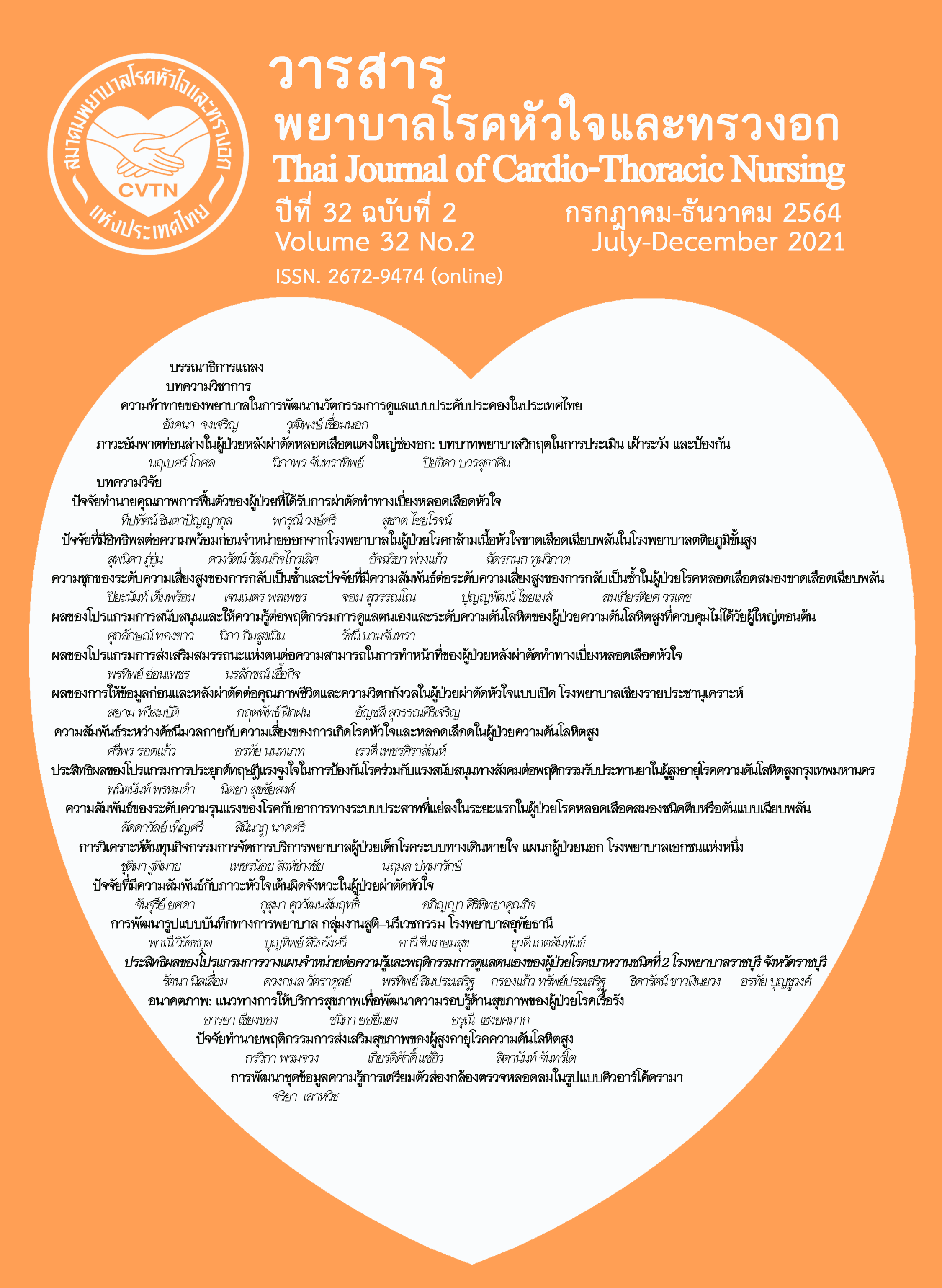ผลของโปรแกรมการสนับสนุนและให้ความรู้ต่อพฤติกรรมการดูแลตนเองและระดับความดันโลหิตของผู้ป่วยความดันโลหิตสูงที่ควบคุมไม่ได้วัยผู้ใหญ่ตอนต้น
คำสำคัญ:
การสนับสนุนและให้ความรู้, แอพพลิเคชั่นไลน์, พฤติกรรมการดูแลตนเอง, ผู้ป่วยความดันโลหิตสูงวัยผู้ใหญ่ตอนต้นบทคัดย่อ
การวิจัยกึ่งทดลองแบบสองกลุ่มวัดก่อนและหลังการทดลองครั้งนี้ มีวัตถุประสงค์เพื่อศึกษาผลของโปรแกรมการสนับสนุนและให้ความรู้ร่วมกับแอพพลิเคชั่นไลน์ ในผู้ป่วยความดันโลหิตสูงที่ควบคุมไม่ได้ วัยผู้ใหญ่ตอนต้น กลุ่มตัวอย่างเป็นผู้ป่วยความดันโลหิตสูงที่ควบคุมไม่ได้ วัยผู้ใหญ่ตอนต้นที่มารับบริการ ตรวจรักษาในแผนกผู้ป่วยนอกโรงพยาบาลราชวิถี เลือกแบบเฉพาะเจาะจงตามเกณฑ์คุณสมบัติ จำนวน 60 คน แบ่งเป็นกลุ่มทดลองและกลุ่มควบคุม กลุ่มละ 30 คน โดยกลุ่มทดลองได้รับโปรแกรมการสนับสนุนและให้ความรู้ตามแนวคิดของโอเร็มร่วมกับแอพพลิเคชั่นไลน์ เป็นเวลา 12 สัปดาห์ เก็บรวบรวมข้อมูลโดยแบบสอบถามพฤติกรรมการดูแลตนเอง และเครื่องวัดความดันโลหิต วิเคราะห์ข้อมูลโดยใช้สถิติเชิงพรรณนา Independent T- Test และ Paired T- Test
ผลการวิจัยพบว่า หลังจากเข้าร่วมโปรแกรมการสนับสนุนและให้ความรู้ในการดูแลตนเอง กลุ่มทดลองมีพฤติกรรมการดูแลตนเอง สูงกว่าก่อนการทดลอง และสูงกว่ากลุ่มควบคุมอย่างมีนัยสำคัญทางสถิติที่ระดับ .001 ค่าเฉลี่ยระดับความดันโลหิตซิสโตลิกกลุ่มทดลองหลังได้รับโปรแกรม (MEAN = 137.5, S.D= 10.91) ต่ำกว่าก่อนได้รับโปรแกรม (MEAN = 149.30 , S.D= 10.39) และค่าเฉลี่ยระดับความดันโลหิตไดแอสโตลิก หลังได้รับโปรแกรม (MEAN = 85.03 , S.D=9.59) ต่ำกว่าก่อนได้รับโปรแกรม (MEAN = 95.83, S.D= 8.62) และต่ำกว่ากลุ่มควบคุมอย่างมีนัยสำคัญทางสถิติที่ระดับ .05 และ .001 ตามลำดับ
สรุปและข้อเสนอแนะ โปรแกรมการสนับสนุนและให้ความรู้ร่วมกับการใช้แอพพลิเคชั่นไลน์ถือเป็นเทคโนโลยีการสื่อสารที่ผู้ป่วยทุกคนเข้าถึงสามารถช่วยส่งเสริมพฤติกรรมการดูแลตนเองและควบคุมระดับความดันโลหิตของผู้ป่วยความดันโลหิตสูงที่ควบคุมไม่ได้ ดังนั้นพยาบาลควรนำโปรแกรมนี้ไปประยุกต์ใช้ ในผู้ป่วยความดันโลหิตสูงที่ควบคุมไม่ได้ วัยผู้ใหญ่ตอนต้น เพื่อส่งเสริมให้ผู้ป่วยมีพฤติกรรมการดูแลตนเองที่ดีขึ้นต่อไป
References
Chockalingam A, Campbell NR, Fodor JG. Worldwide epidemic of hypertension. Can J Cardiol. 2006; 22(7): 553-55
World Health Organization. A global brief on hypertension Silent killer, global public health crisis [Internet]. 2013 [September 15, 2019]. Retrieved from http://www.who.int/cardiovascular _diseases/ publications/global_brief_hypertension/en/
Gooding HC, McGinty S, Richmond TK, Gillman MW, Field AE. Hypertension awareness and control among young adults in the national longitudinal study of adolescent health. J. Gen. Intern. Med. 2014; 29(8): 1098-1104.
Department of Disease Control. 2018 World high blood pressure day campaign message issues [Internet]. 2017 [September 20, 2019]. Retrieved from http://www.Thaincd.com. (in Thai).
Akeparakarn W. Report of Thai public health survey by physical examination, 2014. 5thedition. Nonthaburi: Aksorn grphic and design publishing; 2016. (in Thai).
Srivanichakorn S. Morbidity and mortality situation of non-communicable diseases (diabetes type 2 and cardiovascular diseases) in Thailand during 2010-2014. Disease Control Journal. 2017; 43(4): 385-387. (in Thai)
Thai Hypertension Society. Guidelines in the Treatment of Hypertension. Bangkok: Trickthink; 2019. (in Thai)
Lomplang P, Oba N, Wannapornsiri C. Factors predicting blood pressure level among essential hypertensive patients age under 40 years, Uttaradit Province. Journal of Nursing and Health Sciences. 2011; 5(2): 12-22. (in Thai)
Pakdevong N, Binhosen V. Factor predicted blood pressure control in persons with hypertension in one community hospital. Journal of Nursing and Health Care. 2014; 32(1): 23-30. (in Thai)
Warren- Findlow J, Basalik DW, Dulin M, Tapp H, Kuhn L. Preliminary validation of the hypertension self‐care activity level effects (H‐SCALE) and clinical blood pressure among patients with hypertension. J. Clin. Hypertens. 2013; 15(9): 637-43.
Jariyasakulwong P, Charoenkitkarn V, Pinyopasakul W, Sriprasong S, Roubsanthisuk W. Factors influencing on health promoting behaviors in young adults with hypertension. Princess of Naradhiwas University Journal. 2015; 7(3): 26-36. (in Thai).
Karoonngamphan M, Suvaree S, Numfone N. Health behaviors and health status of workers: a case study of workplaces in Sathorn District, Bangkok Metropolitan. Songklanagarind Journal of Nursing. 2012; 32(3): 51-64. (in Thai).
Hanujalernkul, S. Nursing: science of practice. 2nd edition. Bangkok: VJ printing; 2001. (in Thai).
Wongsri P, Chintapanyakun T. Utilization of Orem’s theory with caring and advice for patients with Heart failure. Journal of the Police Nurse. 2018; 10(1): 209-215. (in Thai)
Orem DE. Nursing: Concept of practice. 5th edition. St. Louis, MO: Mosby Year Book; 2001
Saleema L, Panpakdee O, Arpanantikul M, Chai-Aroon T. The influence of basic conditioning factors and self-care agency on self-care behaviors in Thais with hypertension. Pacific Rim International Journal of Nursing Research. 2016; 20(1): 5-17.
Yang SO, Jeong GH, Kim SJ, Lee SH. Correlates of self-care behaviors among low-income elderly women with hypertension in South Korea. J Obstet Gynecol Neonatal Nurs. 2014;43(1): 97-106.
Douglas BM, Howard EP. Predictors of self-management behaviors in older adults with hypertension. Douglas BM, Howard EP. Predictors of Self-Management Behaviors in Older Adults with Hypertension. Adv Prev Med. 2015;2015: 960263. doi:10.1155/2015/960263
Booncherd C. Follow-up for disabled, bedridden, cancer patients and primary pharmaceutical care by using the Line application in Kut Chum District, Yasothon Province. Journal of Health Science. 2018; 27(5): 921-26. (in Thai)
Jones KR, Lekhak N, Kaewluang N. Using mobile phones and short message service to deliver self‐management interventions for chronic conditions: A meta‐review. Worldviews on Evid Based Nurs. 2014; 11(2): 81-8.
Suthirit S, Pinchaleaw D, Keskomon T. The effectiveness of self-regulation program with line application among overweight health volunteers, Tharongchang district, Surat Thani province. Journal of the Police Nurse. 2018; 10(2): 330-39. (in Thai).
Worapongthon T. Principles of Research in Public Health. 4 edition. Bangkok: Chulalongkorn University. 2000. (in Thai).
Thamnamsin K, Amnadsusad K, Kerdmongkon P, Ardsontea J. Effects of self-care promoting program on self-care behavior among older adults with uncontrolled hypertension in Bangkok metropolitan. Journal of Public Health Nursing. 2015; 29(2): 43-54. (in Thai).
Phetcharat K, Ponglanga S, Kitisri C. Effects of supportive and educative nursing system program on self-care behaviors and blood pressure control among hypertensive patients. Nursing Journal. 2018; 45(1): 37-49. (in Thai).
Plaiyod J, Panpakdee O, Taikerd C. Effects of a promoting self-care participation program on perceived self-care ability, body weight, and blood pressure control in persons with hypertension. Rama Nurse J. 2012; 18(2): 223-36. (in Thai).
Wannakul T, Sopidpakdeepong C, Sukwong W. Effectiveness of health education program applying self-care theory in hypertension patient. Journal of Public Health Nursing. 2012; 26(3): 106-18. (in Thai)
Roengcharuphan P. Effectiveness of health education program applying self-care theory in hypertensive patients. Lanna Public Health Journal. 2015; 11(1): 40-47. (in Thai)
Phimmasone S, Oba N, Laksomya T. Effects of nursing program followed by supportive and educative system on self-care behaviors among patients with hypertension in Lao, PDR. Journal of Nursing and Health Sciences. 2016; 10(1): 1-15. (in Thai).
Hongsila O, Arpanantikul M, Malathum P. Effects of a self-care promoting programme on knowledge, self-care behaviours, and blood pressure in persons with essential hypertension. Thai Journal of Nursing Council. 2018; 33(2): 110-130. (in Thai).
Neter JE, Stam BE, Kok FJ., Grobbee DE, Geleijnse JM. Influence of weight reduction on blood pressure a meta-analysis of randomized controlled trials. Hypertension. 2003; 42(5): 878-84.
Wen H, Wang L. Reducing effect of aerobic exercise on blood pressure of essential hypertensive patients: A meta-analysis. Medicine. 2017; 96(11): 1-6.
Downloads
เผยแพร่แล้ว
How to Cite
ฉบับ
บท
License
Copyright (c) 2022 วารสารพยาบาลโรคหัวใจและทรวงอก

This work is licensed under a Creative Commons Attribution-NonCommercial-NoDerivatives 4.0 International License.
บทความนี้ยังไม่เคยตีพิมพ์หรืออยู่ในระหว่างส่งไปตีพิมพ์ในวารสารอื่น ๆ มาก่อน และกองบรรณาธิการขอสงวนสิทธิ์ในการตรวจทาน และแก้ไขต้นฉบับตามเกณฑ์ของวารสาร ในกรณีที่เรื่องของท่านได้ได้รับการตีพิมพ์ในวารสารฉบับนี้ถือว่าเป็น ลิขสิทธิ์ของวารสารพยาบาลโรคหัวใจและทรวงอก





